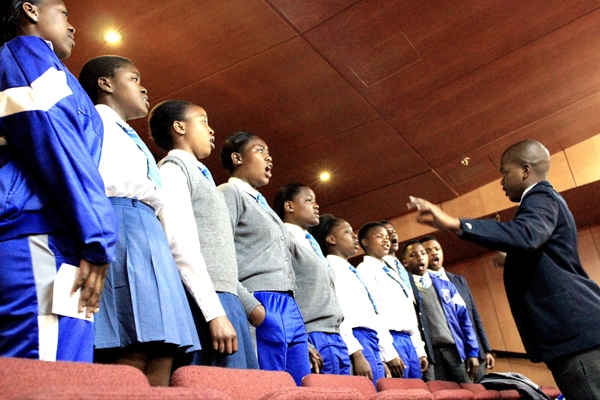Surviving Rivonia Trialists hold dialogue with school learners

Learners from a number of schools in Cape Town had the opportunity to meet surviving Rivonia trialists when a replica of Nelson Mandela’s prison cell on Robben Island was launched to tour the country.
The opening of the Mandela Cell exhibition at V&A Waterfront afforded an opportunity for schoolchildren to interact with the former political prisoners in a dialogue themed: Triumph of the human spirit over adversity and suffering.
Rivonia Trialists Ahmed Kathrada and Dennis Goldberg attended, while the third survivor, Andrew Mlangeni, could not make it. Instead, a video recording of him was played. Kathrada and Goldberg were joined by Kwedi Mkhaliphi, who was imprisoned on Robben Island for 20 years from 1966 to 1986.
Robben Island Museum CEO Sibongiseni Mkhize said the Mandela cell symbolises confinement in a small space. Alluding to the restrictions of apartheid and the Group Areas Acts, he said, “There was a time when the majority of citizens of this country were confined in cells and that has led to difficulties to transform our society today.”
Goldberg described imprisonment as an attempt by the apartheid regime to dehumanise freedom fighters. “You didn’t take up arms with Umkhonto We Sizwe to fight against apartheid government and hope to live,” said Goldberg.
When asked about corruption among his fellow comrades in government, Goldberg said, corruption is the problem that needs to be fought not just in government but in the private sector too.
He said, corruption in the ANC government has followed in the footsteps of the apartheid government, but unlike then, South Africans are today more aware of it.
Kwedi Mkhaliphi with Ahmed Kathrada and Dennis Goldberg at the launch of the Mandela Prison Cell Replica. Photo by Masixole Feni.
All the struggle veterans emphasized the importance of education. They shared their stories of how they educated themselves while incarcerated. Kathrada obtained two degrees while imprisoned at Robben Island.
In a video recording, Mlangeni said that Mandela encouraged all the prisoners to study. “He also organised funds for everyone who wanted to study, yet, he was already a lawyer and in a better position than the most of us,” he said.
Mkhaliphi related how prisoners who had standard six were tasked to educate those who arrived in prison illiterate. Some prisoners could not read personal letters and had to ask for help from fellow inmates to read for them.
Several learners described the interaction with the veterans as life-changing.
“I learned that freedom came at a price, and whatever you have is achievable if you are dedicated, but it comes at a cost,” said Amy Johnston from St Joseph College.
Her fellow classmate in grade 11, Hohoka Grove, said, “I learned that Robben Island was not just about Mandela, but a journey the struggle heroes went through and conquered.”
Another learner from St Joseph College Courtney Morta said she was inspired by the endurance through pain and suffering of the struggle veterans.
Lerato Koko from Fezeka High School said, “I have learned that our heroes suffered a lot, and we have to study and get a good education to honour them and give back to our communities.”
Courtney Alexander from St Joseph said the struggle that they are facing as learners today is different. She said, “We come from different backgrounds, but are faced with the same pressure to be successful, despite our background and circumstances.”
The replica of Madiba’s cell, built by prisoners, will be on display at the Nelson Mandela Gateway, V&A Waterfront, until Thursday.
Support independent journalism
Donate using Payfast

Don't miss out on the latest news
We respect your privacy, and promise we won't spam you.

This article is licensed under a Creative Commons Attribution-NoDerivatives 4.0 International License.
